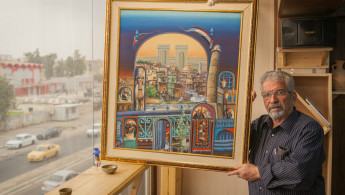Reviving art and culture in Iraq's former Islamic State stronghold
Despite generalised repression against artists by members of IS, Qais had produced dozens of sculptures in the basement of the house, alongside his son, until their liberation by the Iraqi army in late 2016.
"I knew that one day the jihadists would leave," Mustafa told The New Arab.
To not attract attention, each blow of the mallet was gently smoothed. Composed of a wooden structure covered with metal nails, the sculptures remained abstract to prevent the Islamic State from identifying 'any human representations' in the creations.
Following a radical interpretation of religious texts, the Islamic State argues that human representation is contrary to Islam.
To honour his commitment to preserving Mosul's artistic creation, Mustafa was the first guest of the cultural TV show, Ebdaa was Hekaya, launched in January 2018.
"Family and friends were happy to see me on TV," he said proudly.
 |
|
 |
|
| Qais Ibrahim Mustafa, an Iraqi sculptor living in Mosul [Azhar Al-Rubaie] |
The voice of Iraqi artists
The host of the programme, Abdulrahman Al Dulaimi, 23, stands nearby some destroy buildings. Nicknamed 'Leonardo Da Vinci from Mosul' for his paintings, he dreams to be the voice of Iraqi artists in the post-Islamic State era.
But such a project is a source of fear for Al Dulaimi's family, still terrified by the murder of his brother by the Islamic State in 2015.
"I am not afraid of them... they committed countless crimes that could not be documented because there were no journalists or cameras," the young TV presenter said.
 |
|
| Abdulrahman Al Dulaimi has been nicknamed 'Leonardo Da Vinci from Mosul' for his paintings [Sebastian Castelier] |
 |
|
| Abdulrahman Al Dulaimi interviews an artist during his TV show in Mosul [Sebastian Castelier] |
Nowadays, poets, writers, painters, sculptors and singers flock to Ebdaa was Hekaya's studio to publicly express their dream for a new Iraq, where culture goes hand in hand with respect for traditions. Indeed, the programme raises awareness about humanist values promoted by the cultural sector.
"I am happy and proud to see a young man contributing to the restoration of art," smiles Natiq Azizz, the guest of the day.
After the broadcast of the first episode, many Iraqis contacted Al Dulaimi to express their satisfaction over seeing such an initiative to reappear quickly.
"This show is a powerful tool to present the creativity of our artists to the world," he believes.
According to Azizz, numerous artists in Iraq have expressed their willingness to revive the artistic movement in Mosul after the fall of the Islamic State group.
 |
Numerous artists in Iraq have expressed their willingness to revive the artistic movement in Mosul after the fall of the Islamic State group |  |
Aged 71, the grey haired man has been an involuntary witness to four decades of violence that has struck Iraq since the 1980s. Yet, it was the abuse committed by the Islamic State group against artists that remains unforgettable to him.
"They were against all forms of art and destroyed many pieces to put an end to Iraqi culture. This worthless group is a contagious disease," Azizz said.
During the 'occupation', he hid his most precious creations under the mattress of his bed to protect them from being destroyed.
Following its occupation of one-third of Iraqi territory in 2014, IS embarked on a crusade against culture, destroying the Cultural Heritage of a country known as the cradle of the world's oldest civilisations.
But in December 2017, the Iraqi government claimed victory over IS in Iraq, just months after Iraqi Prime Minister Haider al-Abadi declared victory against the group in Mosul. The July 2017 defeat in Mosul came eight months after an alliance of Iraqi armed forces, Shia militias and Kurdish fighters launched an offensive to retake the city. It was considered one of the biggest defeats for the Islamic State group, but the cost of this "liberation" has been immense.
Monitoring group Airwars estimated that between February and June 2017, as many as 5,805 Iraqi civilians were killed in Iraqi and coalition attacks. But many believe the actual number is likely much higher, with rights group Amnesty International saying at the time that the "true death toll of the battle may never be known".
In addition to the deaths, nearly a million people fled their homes during the military operations and the fighting destroyed entire districts of the city, with the scale of destruction unprecedented in Iraq's most recent conflict. The UN estimated that the cost of repairing basic infrastructure is set to top more than $1 billion, with rebuilding likely to take several years.
 |
During the 'occupation', he hid his most precious creations under the mattress of his bed to protect them from being destroyed |  |
Islamic State ideology in Iraq
Enthusiastic by nature, sculptor Qais Ibrahim Mustafa feels invested with a mission of general interest to revive culture in Mosul after IS.
Out of a desire to send a symbolic message, he decided in late 2017 to place a feminine artistic monument at the gates of Mosul's old city, the physical representation of the cultural diversity that characterised Iraq.
But this time, he got impeached to proceed by the Governor of Mosul, claiming that a statue of this nature could hurt conservative citizens.
"Islamic State's influences are still very much present in Iraq," Mustafa concluded, aware that territorial defeat of the extremist group does not mean that its ideology has necessarily disappeared from the minds of many Iraqis.
Sebastian Castelier is a journalist specialising in Iraq and the Gulf. Follow him on Twitter: @SCastelier
Azhar Al-Rubaie is an independent journalist based in Iraq. Follow him on Twitter: @AzherRubaie





 Follow the Middle East's top stories in English at The New Arab on Google News
Follow the Middle East's top stories in English at The New Arab on Google News


